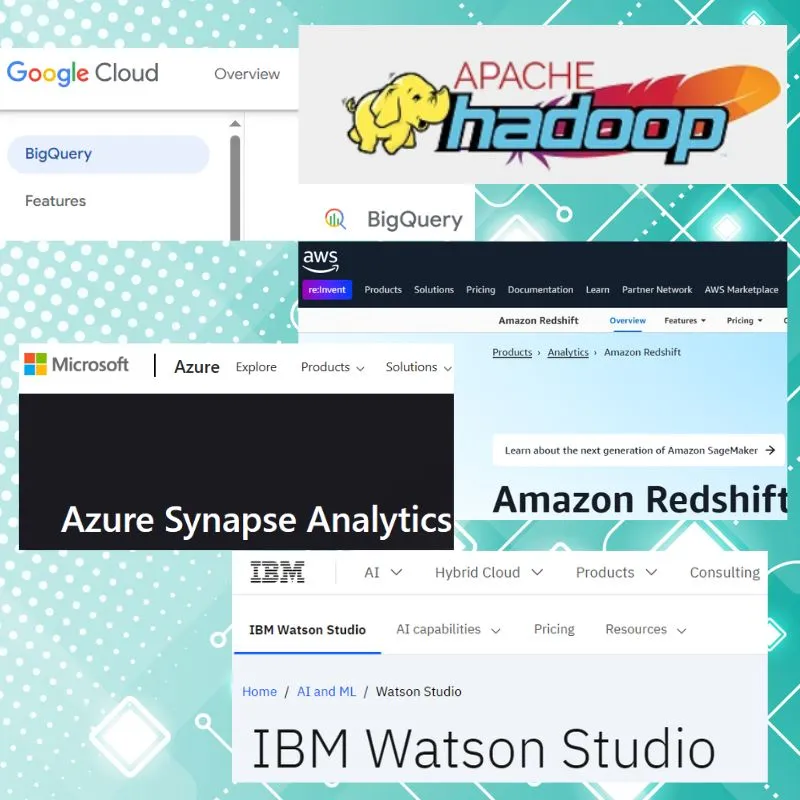Now a days, businesses rely on big data analytics platform to extract meaningful information to make decisions from the large amount of available data. But with so many options out there like Google BigQuery, Amazon Redshift, IBM Watson and many more. It can be time consuming to find the right platform for their purpose. People often ask as how to choose big data analytics platform for business.
In this guide, we shall compare some of the most popular big data analytics platform for business, based on scalability, pricing, ease of use and security. This will help you find the perfect match for your business needs.
Why to Choose Right Big Data Analytics Platform
The right big data analytics platform is very important for transforming raw data into actionable tips that can push growth. An effective platform should enable your business to:
– Process and analyze massive datasets quickly and efficiently.
– Integrate with existing systems to make data processing seamless.
– Provide strong security to protect sensitive information.
– Scale according to business needs, whether you’re a startup or an enterprise.
1. Google BigQuery
Google BigQuery is a fully managed, server less data warehouse designed to simplify big data analysis. Known for its scalability, BigQuery is particularly beneficial for companies handling large datasets and looking to execute quick queries.
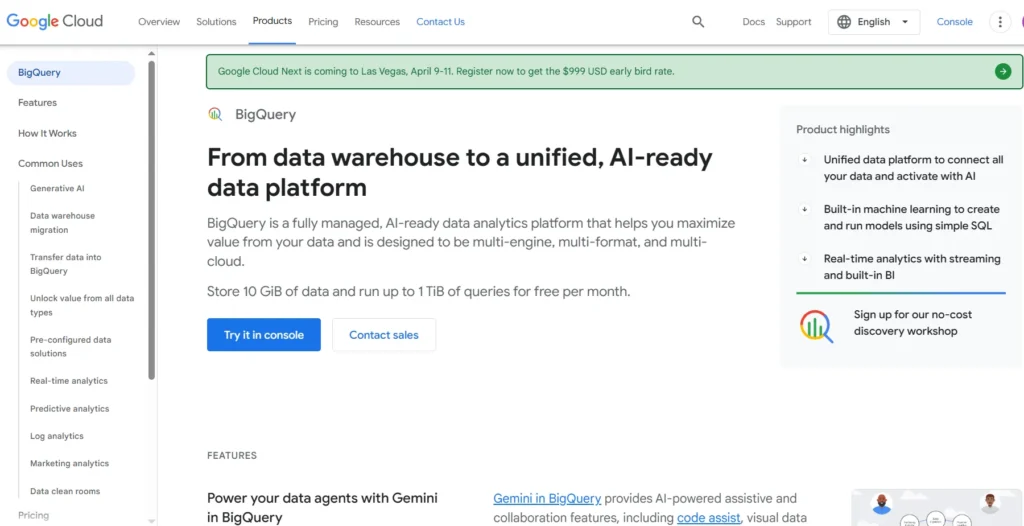
Key Features
– Scalability: BigQuery uses Google’s infrastructure to enable rapid data scaling with no need to manage physical infrastructure. BigQuery can handle petabytes of data, scaling up automatically as your business data grows.
– Ease of Use: Its SQL like interface is user friendly and integrates well with Google’s ecosystem (e.g., Google Sheets, Google Analytics).
– Pricing: BigQuery charges based on usage, with a ‘pay as you go’ model that bills by the amount of data processed per query and data storage costs. This flexibility can be advantageous for businesses with variable data needs.
– Security: BigQuery employs Google’s strong security infrastructure, including data encryption at rest and in transit, multi factor authentication and integrates with Google Cloud Identity and Access Management for secure access control. It is in compliance with industry standards (e.g., ISO 27001, GDPR).
Best For:
BigQuery is well-suited for companies who need powerful data processing without the overhead of managing infrastructure, such as e-commerce businesses with fluctuating data analysis needs.
– Real time analytics and ad hoc queries for businesses that need quick, flexible tips.
Example Use Case:
Spotify uses BigQuery to analyze terabytes of data on user behavior, that provides real time tips to help optimize recommendations and enhance user experience.
2. Amazon Redshift
Amazon Redshift is a cloud based fully managed data warehouse that allows users to run complex queries and integrate with the broader AWS ecosystem. It is known for its high performance, SQL based querying and the ability to scale according to demand.
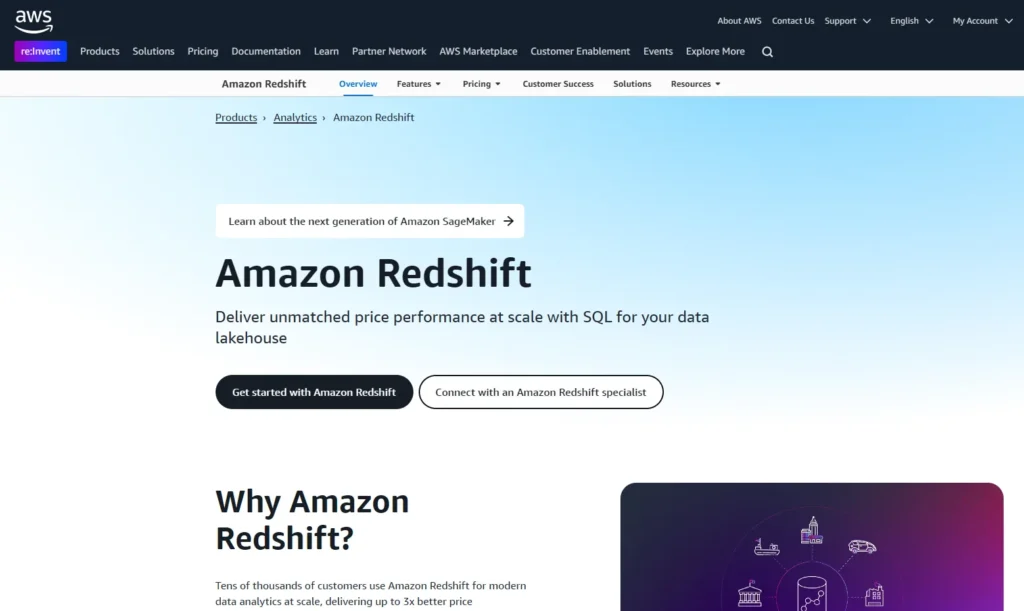
Key Features:
– Scalability: With its massively parallel processing (MPP) architecture, Redshift can scale up from small deployments to petabyte-scale, which makes it highly flexible for growing data needs.
– Ease of Use: Redshift offers a standard SQL interface and integrating with other AWS services is seamless.
– Pricing: Redshift provides an on demand pricing model based on usage, with discounts for reserved instances. Pricing also varies by cluster size, data stored and queries executed.
– Security: Redshift includes data encryption in transit and at rest, network isolation and offers integration with AWS Identity and Access Management (IAM) for enhanced security. Also compliance with various security certifications (e.g., SOC 1, SOC 2 and HIPAA eligibility).
Best For:
– Data heavy workloads for companies that need deep data analysis capabilities and frequently work with structured data.
Example Use Case:
Yelp uses Redshift to analyze large amounts of review data, which enables them to track trends in user feedback and optimize their platform accordingly.
3. IBM Watson Studio
IBM Watson Studio is a collaborative platform that integrates with IBM Cloud for advanced analytics, machine learning and AI driven tips.
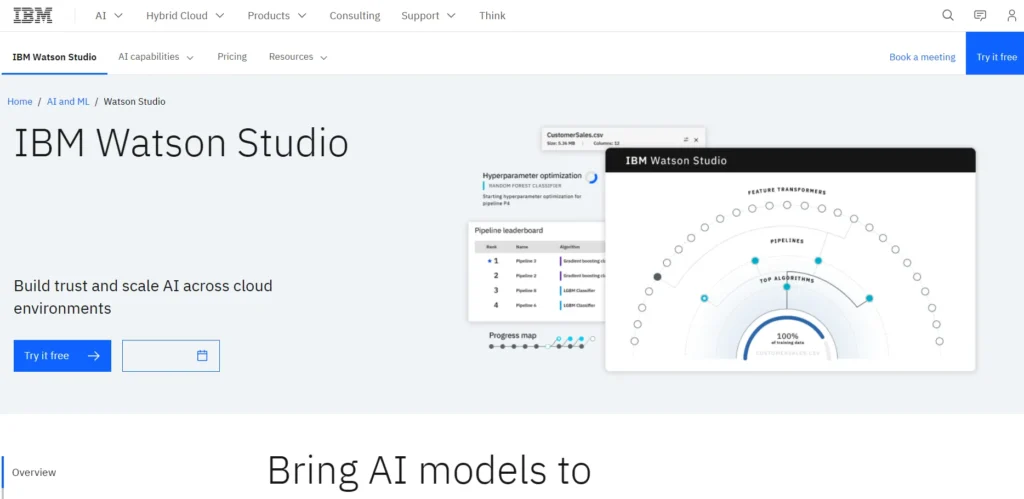
Key Features:
– Scalability: Watson Analytics is suitable for medium to large enterprises, offering cloud based scalability. Watson Studio can handle data at scale, supported by IBM’s enterprise cloud.
– Ease of Use: Watson Studio has an intuitive, drag and drop interface to build machine learning models and analyze data.
– Pricing: Watson Studio has flexible pricing with a free tier and different pricing options based on the level of support and data processing needed. Pricing can vary depending on whether you use Watson on IBM Cloud or other platforms.
– Security: IBM Watson offers strong data protection, including data encryption, compliance with industry standards and role based user access control.
Best For:
– AI driven insights for companies that need advanced machine learning and predictive analytics capabilities.
Example Use Case
KPMG uses IBM Watson Studio to analyze financial data for clients, to identify fraud patterns and to improve audit accuracy by using machine learning models.
4. Apache Hadoop
Apache Hadoop is an open-source framework that stores and processes large datasets using a distributed computing approach. It is highly customizable but requires significant technical expertise.
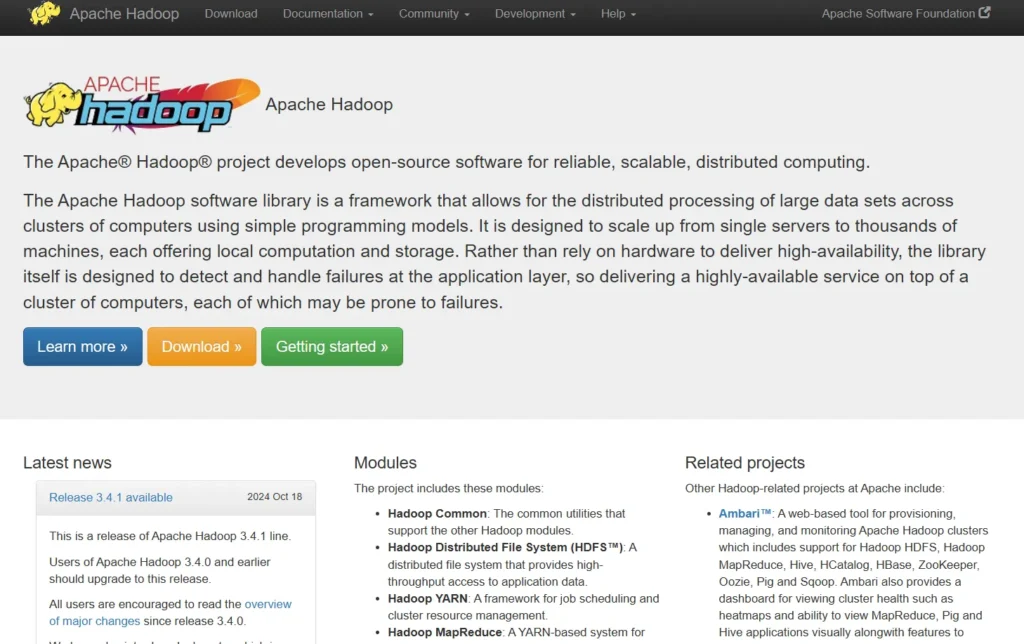
Key Features:
– Scalability: Hadoop’s distributed nature allows it to scale horizontally, which handles petabytes of data across a network of commodity servers.
– Ease of Use: Requires skilled IT personnel, as Hadoop lacks a user friendly interface and relies on tools like Hive and Pig for data querying.
– Pricing: Being open source, Hadoop itself is free, though operational costs can arise from server maintenance, storage and skilled labor.
– Security: Offers role based access control and encryption, but the security setup is largely left to the user’s implementation.
Best For:
– Customizable data processing needs and large scale batch processing for organizations with strong in-house tech capabilities.
Example Use Case:
Yahoo! uses Hadoop to manage its vast data ecosystem, to analyze logs and to optimize the performance of its web properties.
5. Microsoft Azure Synapse Analytics
Azure Synapse Analytics, formerly known as Azure SQL Data Warehouse, is an integrated analytics service that offers both SQL and Spark processing engines.
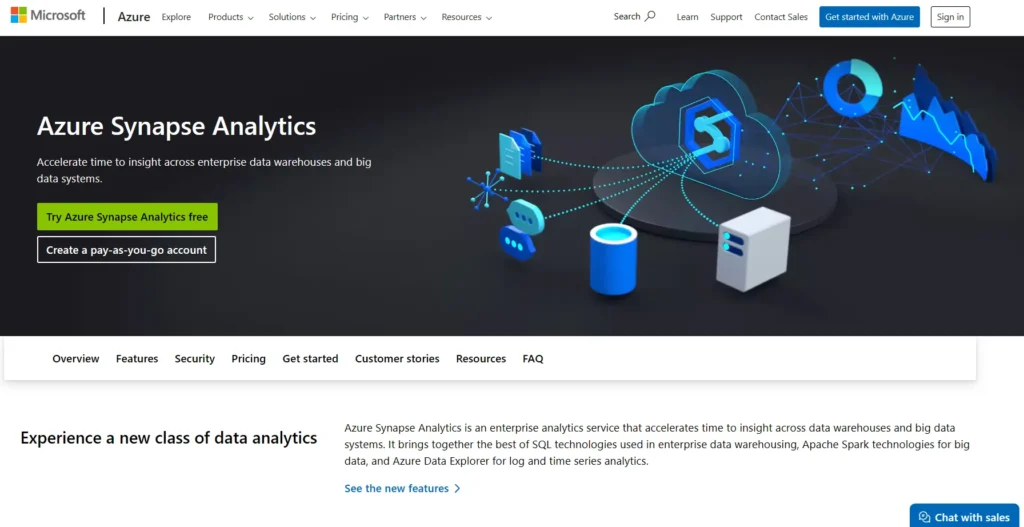
Key Features:
– Scalability: Synapse’s architecture supports on-demand scaling, with separate compute and storage layers.
– Ease of Use: It provides a unified workspace, integrates with other Azure services and supports both SQL and Apache Spark.
– Pricing: Azure Synapse offers a mix of consumption based pricing and reserved pricing, which allows businesses to choose the most cost effective model.
– Security: Synapse offers comprehensive security features, including encryption, virtual network support and advanced threat protection.
Best For:
– Hybrid analytics and organizations that work with both structured and unstructured data within the Azure ecosystem.
Example Use Case:
GE Healthcare uses Azure Synapse Analytics to unify data from various sources, to enable predictive tips that improves patient care and operational efficiency.
Comparison Summary
Here’s a quick summary to help you decide right platform for your need:
| Platform | Best For | Scalability | Ease of Use | Pricing Model | Security Features |
| Google BigQuery | Real-time analytics and ad hoc queries | High | User-friendly | Pay-as-you-go | Encryption, IAM integration |
| Amazon Redshift | Deep data analysis, data-heavy workloads | High | AWS Integration | On-demand/Reserved | Encryption, IAM |
| IBM Watson Studio | AI-driven insights and machine learning | High | User-friendly | Subscription | Strong data protection, compliance |
| Apache Hadoop | Customizable, large-scale batch processing | Very High | Requires expertise | Free, but operational costs apply | Role-based access, encryption |
| Azure Synapse | Hybrid analytics, structured & unstructured | High | Unified Azure workspace | Consumption-based | Advanced threat protection |
How to Choose Big Data Analytics Platform for Business
To select the best big data analytics platform, consider the following criteria:
1. Your Data Scale and Type:
For structured data, Redshift or BigQuery are great choices. For unstructured or complex data, Hadoop or Azure Synapse may be better.
2. Budget:
Open source options like Hadoop can be affordable but may require skilled IT management. The platforms with flexible pricing like BigQuery can fit various budgets.
3. Ease of Integration:
Choose a platform that integrates smoothly with your existing data sources and tools.
4. Advanced Capabilities:
If AI driven tips are essential, then consider IBM Watson or Azure Synapse, which support machine learning.
5. Security Requirements:
Industry specific regulations may require strong security features. Amazon Redshift and Google BigQuery offer compliance with healthcare, finance and other regulated sectors.
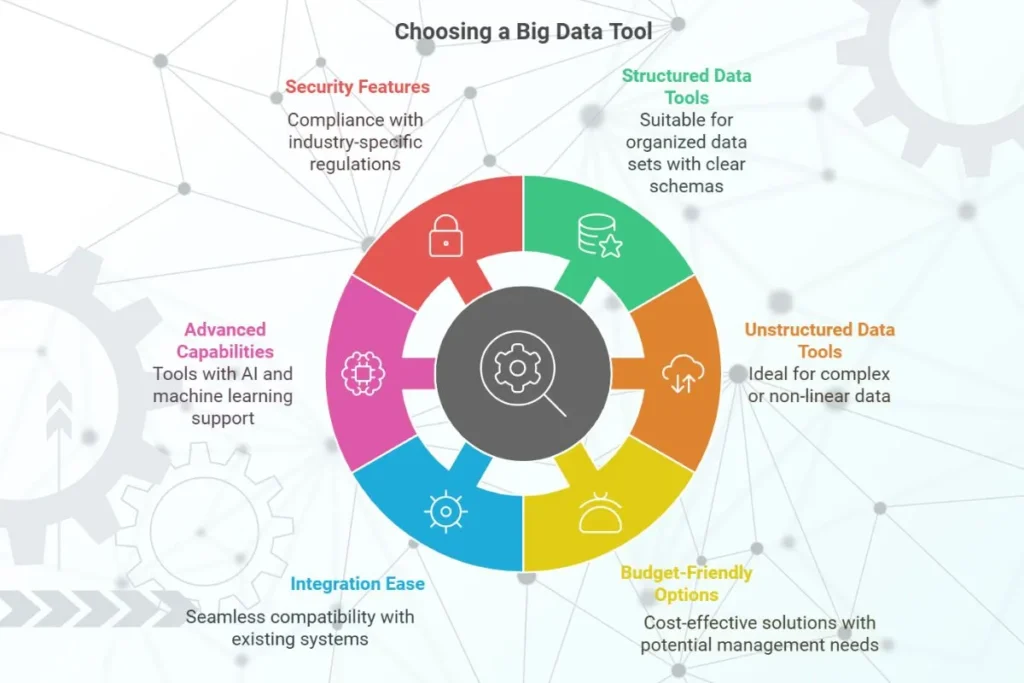
Conclusion
To select the right big data analytics platform can make or break your data strategy. Each platform has unique strengths, so consider your specific business requirements, budget and the expertise available within your team.
If you are looking to utilize Google BigQuery’s real time capabilities, use IBM Watson’s AI insights, or customize with Apache Hadoop, there’s a solution suitable to meet your needs.
Assess factors like scalability, pricing, ease of use, security etc. and select a big data analytics platform that will give important tips to optimize operations and support your business’s growth.
Disclaimer: The websites mentioned above might evolve over time. Always refer to the website and their official documentation for the most accurate and updated information as well as latest offerings, plans and prices etc.

